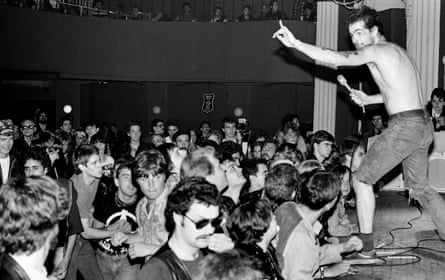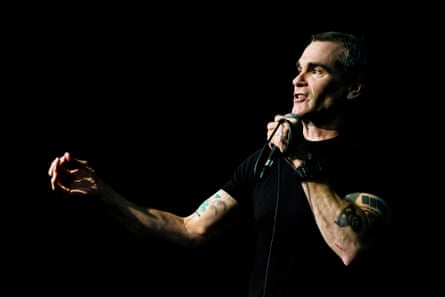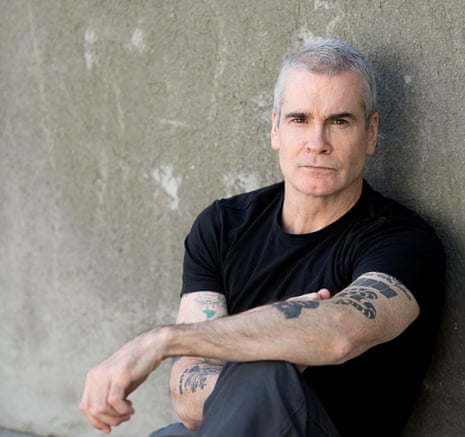As a music obsessive, why have you stepped back from making it? The GingerNinja
I stopped processing ideas in terms of lyrics. One day, I woke up and thought: “I’m done.” My manager flipped out, but I’ve never looked back. I didn’t want to become a human jukebox playing old songs, so I filled the space the band took with films and TV and now my shows, my radio show and writing. At this point, I wouldn’t go back on stage with a band for anything.
Jingle Bells with William Shatner is a fantastic song. Are there any future music collaborations on the horizon? Shivermetimbersnow
Bill called and said: “Henry, I really want you to be on this song with me.” I said: “Bill, for you, anything.” We’d done a song before. He’s just fun to work with. It was the same with the Flaming Lips in 2009. They’re people I know, but, generally, I’ve hung up my shield and sword.
How was the experience of working on the film Heat? Prestonian79
The director, Michael Mann, said: “Your character has scenes with Al Pacino, but if Al doesn’t like you, you can’t be in the movie. So we’re going to have lunch to see if he likes you.” I’m like: “Uh? When?” He goes: “We’re leaving now.” We walked out with my jaw on the floor and went to some high-class Italian restaurant in Beverly Hills.
Al’s like: “Call me Al.” At the end of the lunch, he goes: “Michael, I like him.” Every day on set, I’d go: “How are you, sir?” Al would put his hand on my shoulder, say: “Henry, not so good,” and tell me in great detail about how he’d pulled a muscle in his arm. He was hilarious to be around. There’s one scene where I’m handcuffed, so Al would sit on a couch and keep me company while I was being unlocked: “Someone give me a magic marker. I’m gonna draw a moustache on Henry.” When you’re getting razzed by Al Pacino, how bad is your day?

Is touring a spoken-word show less stressful than a full-band tour? 2HeadedDog
Doing the music was like gladiator sport. I’d lose three pounds of water every show. I’ve ripped up my back and my neck, and my jaw clicks from being smashed around. The talking shows are more demanding, because it’s only me on stage. It’s like comparing surgery with construction – one requires super concentration and the other is just physical. And on the bus it’s not a tribe of stenchy men! It’s four non-smoking, low-key individuals. Backstage, it’s just me.
I heard the sad news about the death of Glen “Spot” Lockett [the influential Black Flag and SST Records producer] . Do you have a story to share, or a favourite album that he produced? HJayJay
Spot had a very old-school way of recording: fewer microphones, less mixing, everything live, like he was cutting a Charlie Parker side. My favourite album he did is The Punch Line by Minutemen, from 1981. They were very argumentative, so Spot would go: “OK, that’s the take. Shut up,” and they were smart enough to listen.
I’ve never met anyone like him. He would go around for days wearing roller-skates. When Black Flag recorded Damaged, Greg Ginn wanted to hear what it sounded like in the studio, so Spot picked up Greg’s guitar and while the band were playing he absolutely nailed the track Damaged II, which is like math rock. Greg was an astonishing guitarist, but he was totally shut down. It was hilarious. The chess master got checkmated.
Your KCRW radio shows are a joy. Which radio DJs inspired and entertained you? VerulamiamParkRanger
My mom took me to see American Graffiti and the character Wolfman Jack’s scenes were so charismatic. I became obsessed with the idea of a mystical voice talking through a clock radio at night who saves your life through music. At KCRW, my late, great friend Deirdre O’Donoghue first taught me how to do it. I’ve been on the station for 14 years and my show is listened to all over the world.
When you put together your playlist for your radio show, what are you looking for in a new artist? Zenon73
To like their music. That’s it. When I was in a band, I always wanted someone to play us on the radio to help us over the wall, so if someone recommends a new band that I like, I’m all over their Bandcamp and buy their entire catalogue. I love the forthcoming album by Snooper from Nashville. It’s a fun record, all 23 minutes of it.

When I was 14, I wrote to all the bands that inspired me. You were one of the few who cared enough to reply. Did you ever write to your heroes? JimKrimson
No, but I came from the Washington DC punk scene, which was very egalitarian. When a young person writes to me, I’d never not write back, because I believe in young people. I don’t want to shut down their enthusiasm.
What are your memories of your time at 52 Harold Mount, Leeds, and recording those early solo/Rollins Band records at Off Beat Studios? Davehumanfly
Chris Haskett from the Rollins Band was living in Leeds, so we made records there and camped out in his freezing flat with a coin-operated meter. The local store served the best onion bhajis I’ve ever had and the owner was forever trying to set Chris up with his daughter.
I learned the land of the whole area. We borrowed a mic from the Mekons and we played the Duchess of York several times. One night, some guy said: “Jimi Hendrix was basically British.” I went: “Right, sit down. You’re going to get schooled on the state of Washington,” and totally went off on this guy.
Your 1994 essay Iron and the Soul, outlining how and why you came to start lifting weights, is up there with Sven Lindqvist’s Bench Press book in redefining reasons for strength training. What is your exercise regime like now? KingOfLuxembourg
I work out six days a week: big pull day, big push day, small push day, a day for abdominals and the rest is cardio. I’m onstage for two and a half hours talking at high speed, and this one leg of the tour is 44 shows straight, so that calorie burn in the afternoon prepares me mentally. As a teenager, I couldn’t throw a ball straight and nobody wanted to play with me. My teacher taught me to lift weights and the gym has been my happy place ever since.
You have a vast record collection; which record do you have the most versions of? Zenon73
I have lots of different pressings of the first Damned album and the first three Buzzcocks albums. Different pressings of Hendrix albums are interesting, especially the South African ones, because during apartheid they didn’t want a non-white guy’s face on the cover. Bowie 7ins from the Philippines are super hard to find and always in bad condition. I buy every Joy Division bootleg. It’s basically the same eight shows, but until I have every pressing my life is not complete.
How did you come to be in possession of the original artwork for the Ruts’ classic 1979 British punk album The Crack? Ferret76
Segs [John Jennings] from the Ruts told me that the painter, John Howard, took it to New York and the band never saw it again. I found John Howard and he told me that he sold it to an art collector who just thought it was a cool picture of a party. He gave me an insanely low price. A while later, Segs told me the back cover artwork had turned up in an auction house in Suffolk, so I bought that as well.
Your mention of electric-era Miles Davis triggered my long-time love and obsession. What are you listening to that might be related? MisterFrisky
I was raised on Miles, but my mom she said she no longer understood him during the electric era. So, in Rollins Band, my bandmates were amazed I’d never heard On the Corner and sat me down and played it. I’m not sure there’s anything like it, but on the bus my road manager has been playing east European 1970s jazz, so I’ve been tracking down records by all these bands whose names I can’t remember.
What are you memories of performing in Ukraine – and would you perform in Kyiv or Moscow now? surgical
Kyiv was really beautiful and the audiences were really thoughtful and appreciative. Russian audiences were always fantastic. Going to Ukraine would be making light of the situation, unless I could afford the flights myself and do a show for free, a sort of tonic for the troops, like I used to do with USO [United Service Organizations, a live-entertainment charity for the US armed forces] in Iraq and Afghanistan. I wouldn’t go to Russia now for fear of something being dropped into my tea.
In your recent book Sic, you mentioned that you have moved to Nashville to realise a major project. What is it? Colindardis
It’s something I’ve been working on for a couple of years with my manager, Heidi May, and I’ve put my life savings into it. All I can say is that we’re looking at launching 14 months from now in Nashville and it will make people smile until their faces hurt.

Comments (…)
Sign in or create your Guardian account to join the discussion